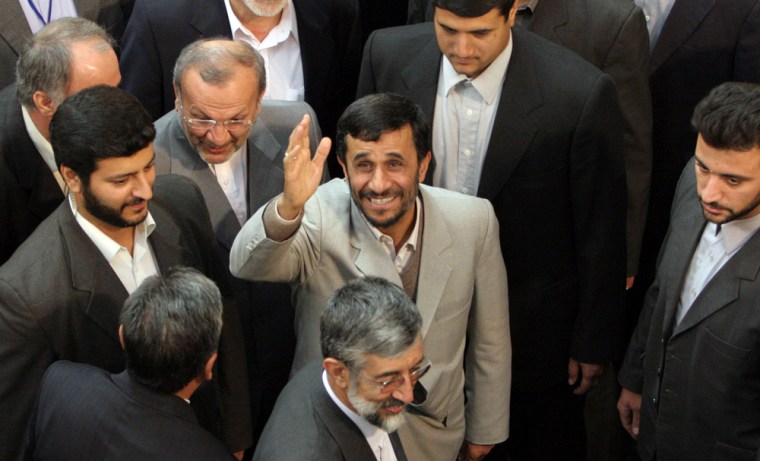The Iranian president’s letter to the American people this week was dismissed by Washington as a crazy propaganda stunt, but there is a rationale behind it: Iran is eager to engage the Great Satan.
With the United States struggling to contain the chaos in Iraq and deal with other problems across the Middle East, Tehran believes it would have the upper hand in any talks with Washington and could win concessions in return for helping ease the turmoil.
So far, Iran’s approaches have gone nowhere. Washington is demanding Tehran stop enriching uranium — a key step in the manufacture of nuclear weapons — before it will come to the table.
Tehran’s style has not helped. It continually rails against “U.S. arrogance,” and President Mahmoud Ahmadinejad’s letter to the American people, released in New York on Wednesday, struck its intended audience as a bizarre political lecture rather than an attempt at dialogue.
The letter branded the Bush administration’s policies a failure and said Americans should press their government to try something new — particularly, withdraw from Iraq.
State Department spokesman Tom Casey called the letter “a public relations stunt” by the Iranian government.
Ahmadinejad surely had an eye on the Iranian public when he sent the letter, trying to show his people he was not just tough but open to talks, but he also may genuinely believe he can persuade Americans by force of argument and ideas.
“He’s ignorant of the attitude of the American people” toward Iran, said Mustafa Alani, an Iran specialist with the Gulf Research Center in Dubai. “He believes that U.S. public opinion will be occupied with his letter and debate it. They (Iranian leaders) have a huge lack of understanding of American public opinion and what moves it.”
New to international diplomacy
Before being elected president in 2005, Ahmadinejad served as the mayor of Tehran and had little experience in international diplomacy. Culture also plays a role in his manner: In Iran — where discussions of poetry and theology are popular obsessions — the abstract debate of ideas is a political tool not seen in the United States.
Iran’s hard-line president has tried such personal contact before. In May, he sent a long letter to President Bush, a combination of religious sermon and political screed, trying to persuade him to change his policies. Soon after, he challenged Bush to a face-to-face debate.
Both approaches were dismissed by the White House — and they fueled Ahmadinejad’s image in the United States as a crackpot, as did his declarations that Israel should be “wiped off the map” and that the Holocaust was a myth.
But Iran appears to be confident that sooner or later, the United States will have to seek talks.
Ahmadinejad’s outreaches to the U.S. have come as his government has aggressively pushed its position as a power-broker in the Middle East. Through its allies — the Palestinian militant group Hamas, Hezbollah in Lebanon and Shiite politicians and militias in Iraq — it can manipulate events in major hotspots for U.S. policy.
For two years, Iran has resolutely refused concessions on its nuclear program — which it says is aimed at peaceful means — and is increasingly under the impression there is nothing the United States can do about it. Washington’s Arab allies are also wary of non-Arab Iran, hoping to stem its influence but also hesitant to anger it.
Ties severed in 1979
Iran and the U.S. have not had diplomatic ties since militants took over the U.S. Embassy following the 1979 Islamic Revolution. Since then, the cleric-led regime has vilified the United States as the “Great Satan” and hard-liners have attacked anyone suggesting opening dialogue.
From its perceived position of strength, Iran now believes it is time to negotiate and possibly even resume its cut diplomatic ties.
“It is recognized in Tehran that lack of relations with the U.S. has affected Iran’s national interests,” said Saeed Laylaz, a political columnist with the independent Iranian newspaper Kargozaran. “Among Iranian presidents so far, Ahmadinejad has shown the biggest amount of eagerness for opening dialogue with the U.S.”
Ahmadinejad’s approaches to the United States appear to have the backing of Iran’s supreme leader, Ayatollah Ali Khamenei, who holds final say in all matters in the country. Khamenei himself came out publicly in favor of negotiations with Washington over Iraq earlier this year.
Iran hopes that any talks would lead to an agreement over its nuclear program — but on its terms, with few limitations on its development — and that the United States would recognize its status as a regional power and end remaining sanctions against it.
The raging sectarian violence in neighboring Iraq could be Iran’s entry point. If the U.S. seeks Iran’s help there, Tehran could expand to address other issues. The Iranians “understand that the Americans are in big trouble in Iraq ... and that their help will have to be rewarded,” Alani said.
That is likely a large reason why Washington is reluctant to engage Iran. It would prefer any talks to have a limited agenda — the Iraq war or Iran’s nuclear program, for example. Broad dialogue, in its view, would have little chance of bringing results and most likely hand Iran a propaganda victory.
